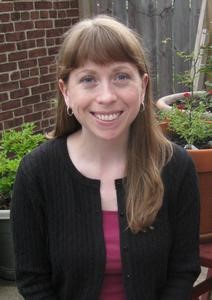JHSPH Alumni Profiles
Dr. Darcy Phelan-Emrick
 Dr. Darcy Phelan-Emrick received her DrPH from the Johns Hopkins Bloomberg School of Public Health (JHSPH), Department of Epidemiology in 2009 and completed her dissertation work on trends in HPV testing in cervical cancer screening at the Johns Hopkins Hospital and Health System. Prior to beginning her graduate studies, Dr. Phelan-Emrick received her bachelor’s degree in microbiology from the University of Michigan. During her MHS training in infectious disease epidemiology at JHSPH, she completed an internship at the New York City Department of Health and Mental Hygiene, where she first became passionate about applied epidemiology. Following completion of her DrPH, Dr. Phelan-Emrick was hired as a faculty Research Associate by the JHSPH Department of Epidemiology and went on to be promoted to Assistant Scientist. She served as Principal Instructor of the large undergraduate course ‘Fundamentals of Epidemiology’ on the Homewood campus for several years, for which she received multiple teaching awards. In 2015, Dr. Phelan-Emrick returned to her applied epidemiology roots and accepted the position of Chief Epidemiologist at the Baltimore City Health Department. There, she directs epidemiological work on a diverse range of public health issues that affect the people of Baltimore City and she compiles/analyzes data for reports that inform local legislature and decision-making. Dr. Phelan-Emrick remains a faculty member within the Department of Epidemiology, and her position as Chief Epidemiologist is jointly funded by JHSPH and the Baltimore City Health Department.
Dr. Darcy Phelan-Emrick received her DrPH from the Johns Hopkins Bloomberg School of Public Health (JHSPH), Department of Epidemiology in 2009 and completed her dissertation work on trends in HPV testing in cervical cancer screening at the Johns Hopkins Hospital and Health System. Prior to beginning her graduate studies, Dr. Phelan-Emrick received her bachelor’s degree in microbiology from the University of Michigan. During her MHS training in infectious disease epidemiology at JHSPH, she completed an internship at the New York City Department of Health and Mental Hygiene, where she first became passionate about applied epidemiology. Following completion of her DrPH, Dr. Phelan-Emrick was hired as a faculty Research Associate by the JHSPH Department of Epidemiology and went on to be promoted to Assistant Scientist. She served as Principal Instructor of the large undergraduate course ‘Fundamentals of Epidemiology’ on the Homewood campus for several years, for which she received multiple teaching awards. In 2015, Dr. Phelan-Emrick returned to her applied epidemiology roots and accepted the position of Chief Epidemiologist at the Baltimore City Health Department. There, she directs epidemiological work on a diverse range of public health issues that affect the people of Baltimore City and she compiles/analyzes data for reports that inform local legislature and decision-making. Dr. Phelan-Emrick remains a faculty member within the Department of Epidemiology, and her position as Chief Epidemiologist is jointly funded by JHSPH and the Baltimore City Health Department.
Dr. Phelan-Emrick chose to pursue a career as an epidemiologist at a local health department due to her interest in studying disease trends at the population level and her desire to give back to the local community. She was initially exposed to the day-to-day work of local health departments during her internship at the New York City Department of Health and Mental Hygiene, and this experience influenced her decision to pursue a DrPH degree and work in applied epidemiology.
The Chief Epidemiologist position requires doctoral training in epidemiology. In addition, Dr. Phelan-Emrick, as well as her predecessors, had several years of post-graduate relevant work or academic faculty experience prior to being recruited.
Dr. Phelan-Emrick’s transition from graduate student to her first position following graduation as faculty Research Associate was relatively seamless, as she remained within the same department and was working directly under a former thesis committee member. Her more recent transition from Assistant Scientist within the JHSPH Department of Epidemiology to Chief Epidemiologist at the Baltimore City Health Department was more of an adjustment due to the inherent differences between working within academia and working in local government. Dr. Phelan-Emrick finds it extremely rewarding to see the results and translational value of her work at the health department. She also sometimes misses the autonomy that is characteristic of academic research. Her current epidemiological work is broadly diverse and directly shaped by the needs of the population, the targeted goals of the health department, and the availability of funding/personnel.
The day-to-day work environment is highly variable depending upon the immediate deadlines of the Baltimore City Health Department but is generally busy due to many ongoing projects and competing priorities. As Chief Epidemiologist, Dr. Phelan-Emrick closely works with the other health department officials on a daily basis and serves as a senior advisor to the Health Commissioner. She directly supervises two staff members and two graduate-level interns.
For positions at the Baltimore City Health Department, U. S. citizenship is not required, however this may differ for health departments within other cities/states.
Even for entry level positions, institutions are often looking to hire individuals with some prior exposure to the field to ensure that whoever is selected understands the job environment and expectations for that position. Gaining as much relevant experience as possible (either through volunteering, coursework, or internships) will be both educational and may also help indicate whether you are a good fit for the position. For Dr. Phelan-Emrick, she cites her early internship at the New York City Department of Health and Mental Hygiene as a really rewarding and memorable experience that was instrumental in making her current career path available to her.
Effective data representation and advanced statistical coding are key skills required for Dr. Phelan-Emrick’s position when she generates reports on complex public health issues that are used to inform local policymaking. She has especially found GIS (geographic information system)/mapping to be a highly valuable skill for her analyses and suggests that all epidemiologists learn or take courses in GIS.
Thank you again to Dr. Phelan-Emrick for her time in conducting this informational interview.
This interview was conducted by Jane Yeh, a PhD candidate in the Department of Molecular Microbiology and Immunology, in collaboration with the Professional Development and Career Office at the Johns Hopkins School of Medicine.
Current students: if you are interested in connecting with Dr. Phelan-Emrick or other alumni for your own career exploration, please contact: phd_recruit@jhmi.edu.
Alumni: if you are willing to be contacted by a current student for an informational interview to have a profile made about your career path, please contact: phd_recruit@jhmi.edu.
